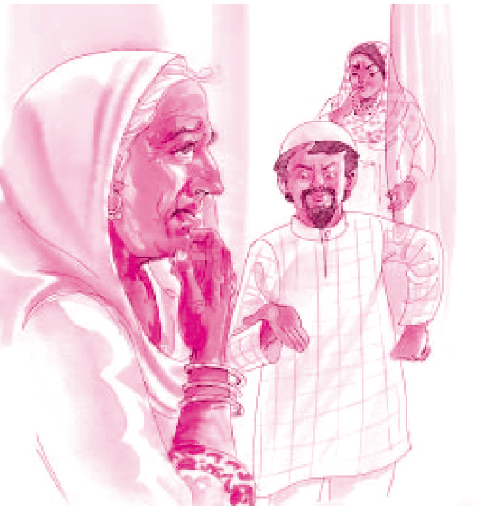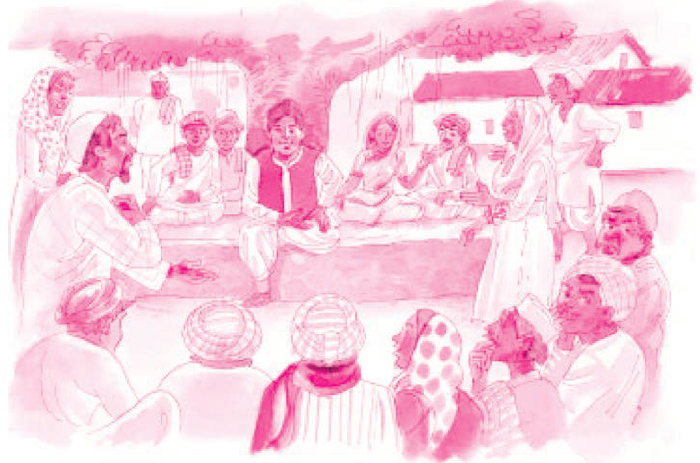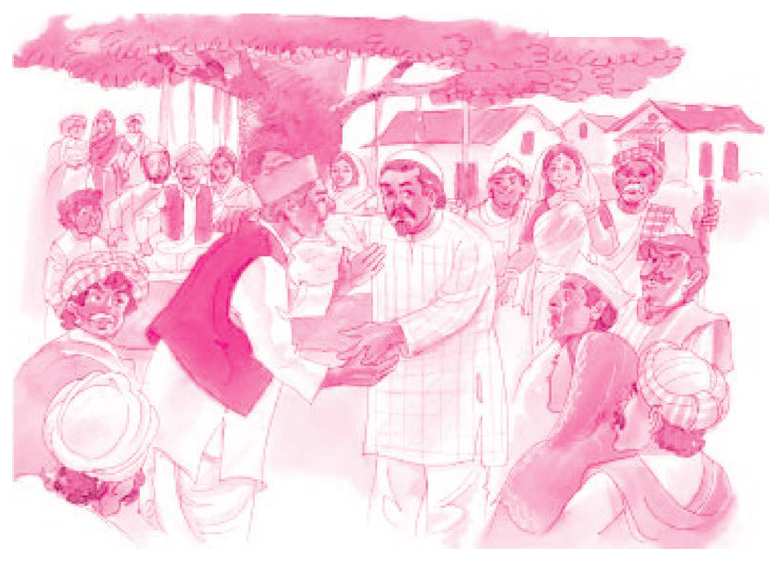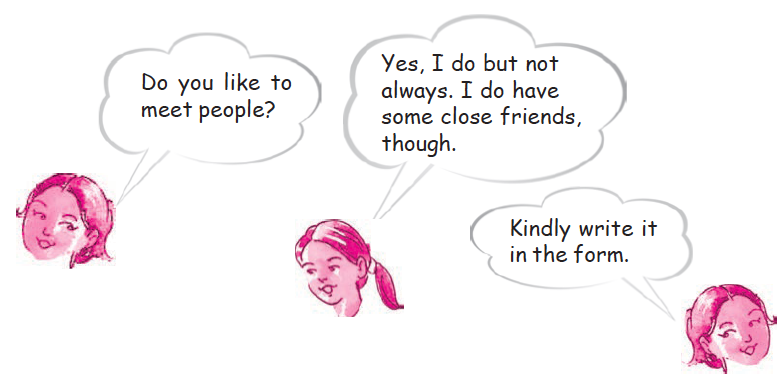Table of Contents
7
Before you read
Has your best friend ever done something you thought was wrong? What did you do then? Did you keep quiet or did you tell your friend what you thought?
Read this story about two friends who had to decide what was more important — friendship and enmity, or a sense of what is right and what is wrong.
Fair Play
Part I
1. Jumman Shaikh and Algu Chowdhry were good friends. So strong was their bond of friendship that when either of them went away from the village, the other looked after his family. Both were greatly respected in the village.
2. Jumman had an old aunt who had some property. This she transferred to him on the understanding that she would stay with him and he would look after her. The arrangement worked well for a couple of years. Then the situation changed. Jumman and his family were tired of the old relative. Jumman became as indifferent to her as his wife, who grudged even the little food that the old lady wanted every day. She swallowed these insults along with her food for a few months. But patience has its limits.
became indifferent: lost interest in or did not care for
grudged: gave unwillingly; felt angry/ unhappy about giving swallowed these
insults: tolerated them

3. One day she spoke to Jumman, “My son, it is now obvious that I am not wanted in your house. Kindly give me a monthly allowance so that I can set up a separate kitchen.”
“My wife knows best how to run the house. Be patient,” said Jumman shamelessly. This made his aunt very angry and she decided to take her case to the village panchayat.
4. For many days, the old lady was seen talking to the villagers explaining her case and seeking their support. Some sympathised with her, others laughed
at her and a few others advised her to make it up with her nephew and his wife. At last she came to Algu Chowdhry and spoke to him. “You know, Chachi, Jumman is my best friend. How can I go against him?” Algu said. “But is it right, my son, to keep mum and not say what you consider just and fair?” pleaded the old lady. “Come to the panchayat and speak the truth,” she said. Algu didn’t reply, but her words kept ringing in his ears.
make it up: stop quarreling; come to an agreement with
mum: quiet/silent
Part II

5. The panchayat was held the same evening under an old banyan tree. Jumman stood up and said, “The voice of the Panch is the voice of God. Let my aunt nominate the head Panch. I will abide by her decision.”
nominate: propose/suggest someone’s name for something
abide by: accept
6. “The Panch knows neither friend nor enemy. What do you say to Algu Chowdhry?” the old lady announced.
“Fine,” replied Jumman hiding his joy over this unexpected piece of luck.
“Chachi, you are aware of my friendship with Jumman,” said Algu.
“I know that,” replied the aunt, “but I also know that you will not kill your conscience for the sake of friendship. God lives in the heart of the Panch, and his voice is the voice of God.” And the old lady explained her case.
“Jumman,” said Algu, “you and I are old friends. Your aunt is as dear to me as you. Now I am a Panch. You and your aunt are equal before me. What have you to say in your defence?”
“Three years ago,” began Jumman, “my aunt transferred her property to me. I promised to support her as long as she lived. I have done all I could. There have been a couple of quarrels between my wife and her but I can’t stop it. Now my aunt is claiming a monthly allowance from me. This is not possible. That’s all I have to say.”
7. Jumman was cross-examined by Algu and others. Then Algu announced, “We have gone into the matter carefully. In our opinion, Jumman must pay his aunt a monthly allowance, or else the property goes back to her.”
8. Now, the two friends were seldom seen together. The bond of friendship between them was broken. In fact, Jumman was Algu’s enemy and wanted his revenge.
seldom: rarely
Part III
9. Days passed and, as ill luck would have it, Algu Chowdhry found himself in a tight spot. One of his fine pair of bullocks died, and he sold the other to Samjhu Sahu, a cart driver of the village. The understanding was that Sahu would pay the price of the bullock in a month’s time. It so happened that the bullock died within a month.
tight spot: difficult situation
10. Several months after the bullock’s death, Algu reminded Sahu of the money he hadn’t yet paid. Sahu got very annoyed. “I can’t pay you a penny for the wretched beast you sold me. He brought us nothing but ruin. I have a bullock. Use it for a month and then return it to me. No money for the dead bullock,” he said angrily.
11. Algu decided to refer the case to the panchayat. For a second time in a few months, preparations for holding the panchayat were made, and both the parties started meeting people seeking their support.
12. The panchayat was held under the old banyan tree. Algu stood up and said, “The voice of the Panch is the voice of God. Let Sahu nominate the head Panch. I will abide by his decision.”
13. Sahu saw his chance and proposed the name of Jumman. Algu’s heart sank and he turned pale. But what could he do?
14. The moment Jumman became head Panch, he realised his responsibility
as judge and the dignity of his office. Could he, seated in that high place, have his revenge now? He thought and thought. No, he must not allow his personal feelings to come in the way of speaking the truth and doing justice.

16. Soon after, Jumman came to Algu, embraced him and said, “Since the last panchayat, I had become your enemy. Today I realised what it meant to be a Panch. A Panch has no friend nor enemy. He knows only justice. Let no one deviate from the path of justice and truth for friendship or enmity.”
Algu embraced his friend and wept. And his tears washed away all the dirt of misunderstanding between them.
deviate: move away from; leave
Premchand
[retold]
Working with the text
A. Match the sentences under I with those under II.
I
1. Jumman and Algu were the best of friends.
2. Jumman’s aunt transferred her property to him.
3. The aunt decided to appeal to the panchayat.
4. Algu was unwilling to support the aunt.
5. Jumman was very happy to hear Algu’s name as head Panch.
II
1. He believed that his friend would never go against him.
2. She wanted justice.
3. In the absence of one, the other took care of his family.
4. The condition was that he would be responsible for her welfare.
5. The bond of friendship between him and Jumman was very strong.
B. Who says this to whom and why?
1. “My wife knows best how to run the house.”
2. “But is it right, my son, to keep mum and not say what you consider just and fair?”
3. “What have you to say in your defence?”
4. “I can’t pay you a penny for the wretched beast you sold me.”
5. “Victory to the panchayat. This is justice.”
C. Answer the following questions.
1. “Then the situation changed.” What is being referred to? (2)
2. When Jumman’s aunt realised that she was not welcome in his house, what arrangement did she suggest? (3)
3. What was the villagers’ reaction when the aunt explained her case to them? (4)
4. Why was Jumman happy over Algu’s nomination as head Panch? (6)
5. “God lives in the heart of the Panch.” the aunt said. What did she mean? (6)
6. What was Algu’s verdict as head Panch? How did Jumman take it? (7, 8)
7. Algu found himself in a tight spot. What was his problem? (9)
8. Why was Algu upset over Jumman’s nomination as head Panch? (12, 13)
9. What was Jumman’s verdict as head Panch? How did Algu take it? (14, 15)
10. Which of the following sums up the story best?
(i) “I also know that you will not kill your conscience for the sake of friendship.”
(ii) “Let no one deviate from the path of justice and truth for friendship or enmity.”
(iii) “The voice of the Panch is the voice of God.”
Give a reason for your choice.
Working with Language
A. Replace the italicised portion of each sentence below with a suitable phrase from the box. Make necessary changes, wherever required.
look after swallow make it up keep mum go into
ease one’s conscience as ill luck would have it
a tight spot take chances my heart sank
1. The best way to avoid an unnecessary argument is to remain silent.
2. Unfortunately, the train I was trying to catch was cancelled.
3. He has been told not to take risks while driving a car through a crowded street.
4. The patient needs to be properly taken care of.
5. Why don’t the two of you end your quarrel by shaking hands?
6. I was in a difficult situation till my friends came to my rescue.
7. When I saw a pile of dirty dishes, I felt very disappointed.
8. I will examine the matter carefully before commenting on it.
9. They criticised him in the meeting but he accepted without protest all the criticism.
10. It will free me from worry to know that I had done nothing wrong.
B. Look at the following phrases and their meanings. Use the phrases to fill in the blanks in the sentences given below.
set up — put in place or start
set aside — save or keep for a particular purpose
set down — write or record
set out — start on a journey
set in — begin and seem likely to continue
1. Why don’t you ————————————— your ideas on paper?
2. A fund has been ————————————— for the soldiers’ families.
3. We should ————————————— a little money every month.
4. You should buy some woollens before winter ——————— .
5. They ———————————— on the last stage of their journey.
Speaking and Writing
A. Look at the following picture. One asks a question, the other answers it. Then the answer is noted in a form as shown below.


B. Work in small groups. Ask your partner the questions given below. If possible, ask him/her a reason for saying Yes or No. Then tick Yes/No, whichever is proper.
1. Do you have a separate room for sleep and study? Yes/No
2. Would you prefer to live in a joint family? Yes/No
3. Do you get on with people? Yes/No
4. Do you like the area you live in? Yes/No
5. Do you find the place overcrowded? Yes/No
6. Do you use public transport? Yes/No
7. Would you like a vehicle of our own? Yes/No
8. Do you like reading? Yes/No
9. Would you like to be a teacher/doctor/engineer/architect? Yes/No
C. Now that you have completed the above project, write a brief report stating what you did, how you did it and the conclusion.
Dictation
Your teacher will speak the words listed below. Write against each a word of opposite meaning.
Examples: liquid solid
hard soft
1. old —————————————————
2. wet —————————————————
3. open —————————————————
4. blunt —————————————————
5. forget —————————————————
